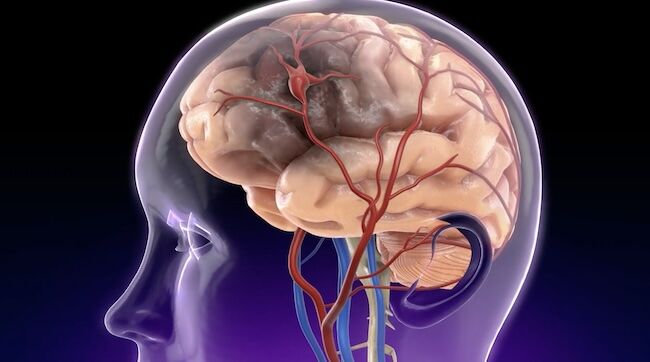Stroke Risk, Blood Pressure Changes & Heart Valve Disease Progression
Written By: Allison DeMajistre, BSN, RN, CCRN
Medical Expert: Patrick McCarthy, MD, Executive Director, Bluhm Cardiovascular Institute, Northwestern Medicine
Reviewed By: Adam Pick, Patient Advocate, Author & Website Founder
Published: February 17, 2026
Patients who have been living with a heart valve problem for many months or years may not recognize when there is a progression in their symptoms as changes can happen slowly over time. Additionally, the cardiovascular system has many interconnected parts that not only affect the heart but other parts of the body. When heart valve disease becomes more advanced, unexpected problems can arise, and patient concerns associated with stroke and blood pressure can elevate.
We received an interesting patient question from Patty related to this topic about how changes in one’s condition relate to the progression of heart valve disease. Patty asked, “Medication has maintained my blood pressure for several years. A sudden drop took place a month ago. My cardiologist paused my blood pressure medication. However, it has remained low for a month or so. My valve is now at a severe stage. Do blood pressure readings have a significant role in determining the progression of heart valve disease? And do these fluctuations increase stroke risk?”
To answer Patty’s question, we met with Dr. Patrick McCarthy, the Executive Director of the Bluhm Cardiovascular Institute at Northwestern Medicine in Chicago, Illinois. Dr. McCarthy has performed over 10,000 cardiac surgeries during his career and treated over 200 patients in the HeartValveSurgery.com community.
Facts About Changing Blood Pressure, Stroke Risk, and Heart Valve Disease
Here are the key insights shared by Dr. McCarthy:
- Different mechanisms control blood pressure and heart valve function. “Good question,” said Dr. McCarthy. “So, you would think that your blood pressure is controlled by your heart valve, but usually not very much. Usually, it’s a different mechanism that controls your blood pressure. There are conditions like a leaky aortic valve where blood flows backwards through the aortic valve, which may drop the lower number, the diastolic number, on your blood pressure. If you have severe aortic stenosis where the valve doesn’t open very well, blood pressure could potentially drop. With both of those conditions, if they’ve progressed to that phase, then it is time to be thinking about having surgery. If your doctor thinks the blood pressure is related to the heart valve disease, then that is an indication.”
- How is blood pressure related to stroke risk? “Can blood pressure changes cause a stroke or contribute to it? It certainly can,” said Dr. McCarthy. “You don’t want your blood pressure too high because that can cause a stroke, where you can have a bleed into the brain. If it’s too low, you may not get perfusion to the brain. Anytime that you’re running a low blood pressure, you need to be carefully assessed.”

Thanks Dr. McCarthy and Northwestern Medicine!
On behalf of all the patients in our community, thank you, Dr. Patrick McCarthy, for everything you and your team are doing at Northwestern Medicine in Chicago, Illinois!
Related links:
- Stroke Risk Reduction for Heart Valve & Atrial Fibrillation Patients
- Ask Dr. McCarthy: Scar Tissue & Minimally-Invasive Heart Valve Reoperations
- Doctor Q&A: What Can Heart Surgery Patients Expect In The Hospital?
Keep on tickin,
Adam
P.S. For the deaf and hard-of-hearing members of our patient community, we have provided a written transcript of our interview with Dr. McCarthy below.
Video Transcript:
Adam Pick: Hi everybody. It’s Adam with HeartValveSurgery.com and we’re in Los Angeles, California at the Society of Thoracic Surgeons Conference.
I am thrilled to be joined by Dr. Patrick McCarthy, who is the Executive Director of the Bluhm Cardiovascular Institute at Northwestern Medicine in Chicago, Illinois. Dr. McCarthy. It is great to see you again.
We’ve known each other for over 15 years. You’ve treated over 200 patients in the heart valve surgery. com community. It’s a gift to see you once again. Thanks for being with me.
Dr. Patrick McCarthy: Thanks, Adam.
Adam Pick: We are seeing great information come out here this year at STS. A lot of great learnings. We’re also getting patient questions coming to us from patients all over the world. This one came in from Patty and she asks, “Medication has maintained my blood pressure for several years. A sudden drop took place a month ago. My cardiologist paused my blood pressure medication. However, it has remained low for a month or so. My valve is now at a severe stage. Do blood pressure readings have a significant role in determining the progression of heart valve disease? And do these fluctuations increase stroke risk?”
Dr. Patrick McCarthy: Good question. So, you would think that your blood pressure is controlled by your heart valve, but usually not very much. Usually it’s a different mechanism that is controlling your blood pressure. There are things like a leaky aortic valve, where the blood’s going backwards through the aortic valve, and that may drop the lower number, the diastolic number on your blood pressure.
Potentially if you’re I have like a severe aortic stenosis. It doesn’t open very well. Potentially, your blood pressure would drop with that quite a bit, but usually not like for a month. And both of those, if they’re progressed to that phase, then it really is time to be thinking about having surgery.
So, if your doctor thinks that the blood pressure is related to the heart valve disease, Then that’s an indication. Can they, uh, cause a stroke or contribute it? It certainly can. You don’t want your blood pressure too high. That can cause a stroke where you can have a bleed into the brain. Or if it’s too low, you may not get perfusion to your brain.
Anytime that you’re running a funny blood pressure like that that’s low, you really need to care, carefully be assessed.
Adam Pick: Well, thank you so much, Dr. McCarthy, for helping us learn more about blood pressure, medications, heart valve disease, and stroke. On behalf of all the patients at HeartValvesurgery.com, thanks to you and your team at Northwestern Medicine in Chicago.
Dr. Patrick McCarthy: Thanks Adam. Always appreciate what you do for the patients.






